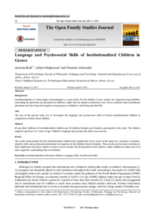Displaying 801 - 810 of 1482
This study investigated the language and psychosocial skills of pre-school aged Greek institutionalized children in comparison to Greek children of the same age raised in a family environment.
All over the world, children are placed in orphanages because their families do not have the resources to care for them. In this short film, a mother makes the difficult decision to leave her daughter to the care of an orphanage.
This study consulted with young people in Australia about their perspectives on what makes residential care safe and how safety could be improved within residential care.
This study provides a background on the historical, cultural, and social circumstances in Ukraine as it relates to the continued institutionalization of children in the country, despite efforts for reform.
This study investigated the prevalence and nature of abuse experienced by children in secular and non-secular care institutions in Germany.
This chapter serves as an introduction to the book Child Maltreatment in Residential Care and provides a brief overview of the research on child maltreatment within the context of institutional care.
This secondary analysis, based off data collected in 1999 by the Survey on Child Abuse in Residential Care Institutions in Romania, investiged the prevalence of growth stunting of institutionalized Romanian children and compared the prevalence of stunting between four different institutional contexts.
This paper utilizes a harm-reduction framework to present best practices for improving residential care and reducing the negative effects residential care can have on children's development.
This study presents the findings from a secondary analysis of data collected in 1999, which focused on child abuse and neglect within long-term residential centers in Romania, from a child rights perspective.
This chapter from Child Maltreatment in Residential Care provides an overview of institutional care in Latin America and the Carribean, describes current efforts toward deinsitutionalization and child care reform in the region, and discusses practical suggestions for further research and reform.

